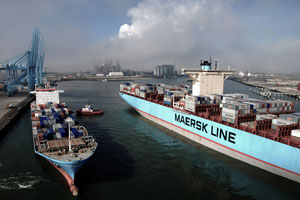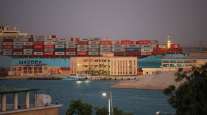Profits at World’s Largest Container Line Drop 43%

A.P. Møller-Maersk A/S, owner of the world’s largest container line, reported a 43% decline in third-quarter profit as the shipping industry continues to suffer from overcapacity.
Net income fell to $429 million last quarter compared with $755 million a year earlier, the Copenhagen-based company said Nov. 2. That total missed the average estimate of $501 million in a Bloomberg News survey of 15 analysts.
“The result is unsatisfactory but driven by low prices,” CEO Soren Skou said in the statement. “We generally perform strongly on cost and volume across businesses.”
RELATED: Analysis — Maersk is taking on water
Maersk said its underlying profit for 2016 will be “below” $1 billion. The company previously had said the full-year result would fall “significantly” short of the 2015 profit of $3.1 billion.
Maersk’s position as the industry giant gives it some scope to ride out low freight rates as it builds up scale.
DNB Markets describes Maersk Line as the “Saudi Arabia of the container market,” with reported average rates lower than consensus expectations. “The combination of strong volume growth but still-low rates means we still believe Maersk Line will continue to use price to gain market share,” DNB said.
An excess of vessels and weak trade growth have driven container lines to try to underbid each other on the rates they offer clients. The climate has proven lethal for some industry members, with South Korea’s biggest line, Hanjin Shipping Co., filing for bankruptcy protection in August. Japan’s three biggest container lines said Oct. 31 that they plan to merge their operations in an effort to return to profit.
“We had hoped the Hanjin bankruptcy would give a boost to Maersk Line in the final quarter, mainly from higher volumes,” Frode Morkedal, an analyst at Clarksons Platou Securities, said in note, but the “weak full-year guidance points to limited positive impact from Hanjin.”
Maersk’s response to the challenges it faces has been to cut costs. On Nov. 2, the shipper announced that expenditures at Maersk Line declined 14% in the quarter, but that was outpaced by a 16% drop in freight rates. The shipping line reported a net operating loss after tax of $116 million compared with a profit by the same measure of $264 million a year earlier.
Maersk also has announced plans to split up its conglomerate, enabling it to focus more on the container operations, for which it will seek acquisitions.
“The implementation of the new strategic direction and the restructuring of the group is progressing,” CEO Skou said.




